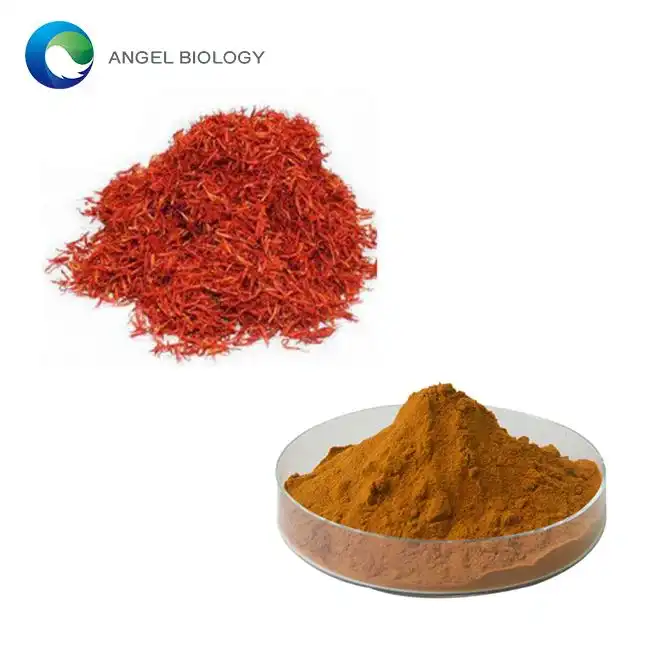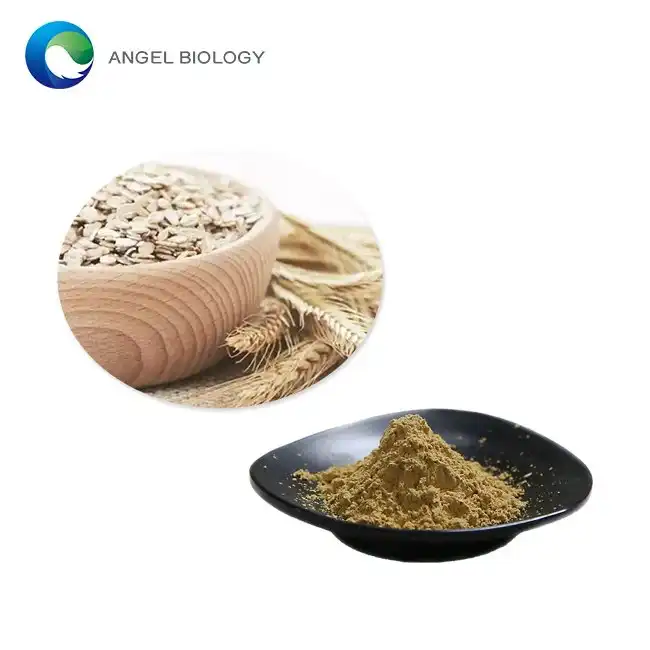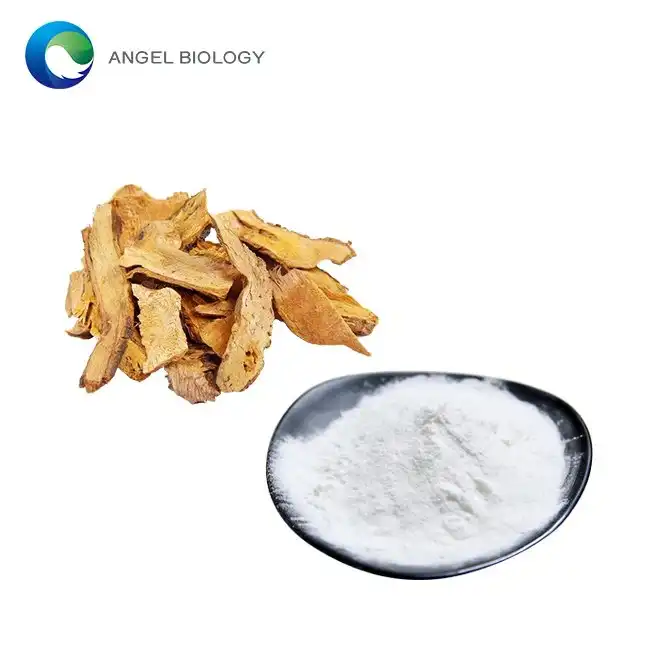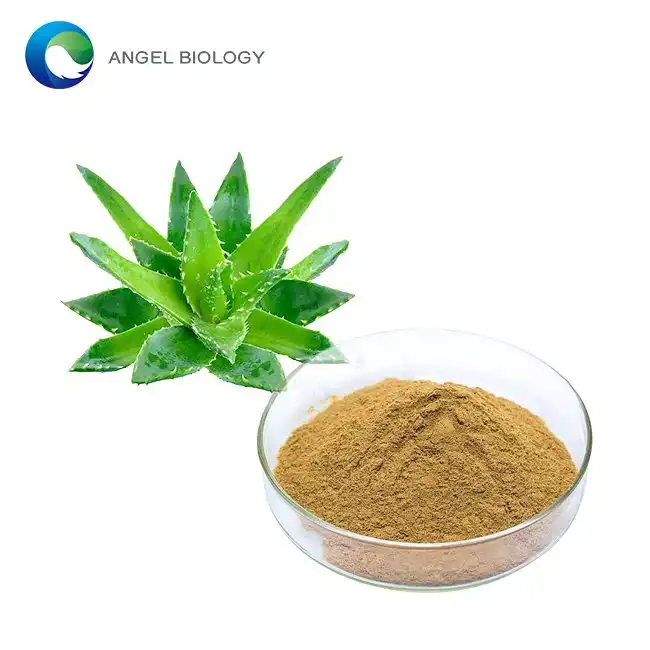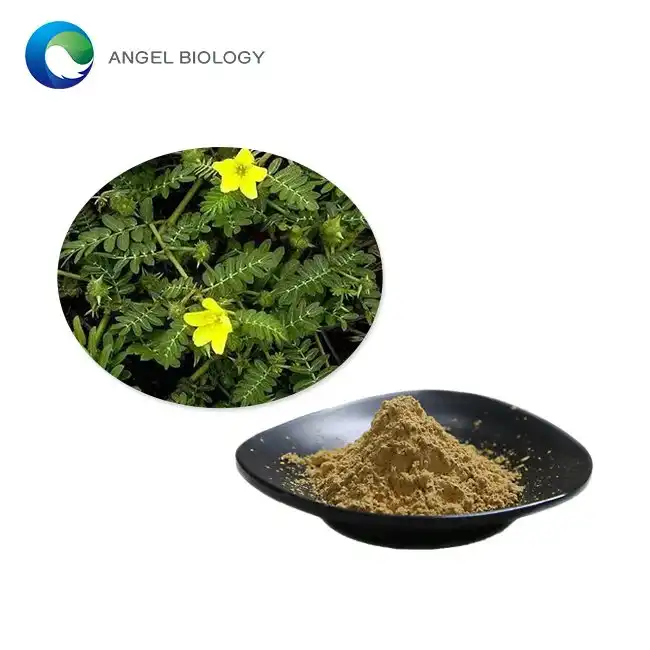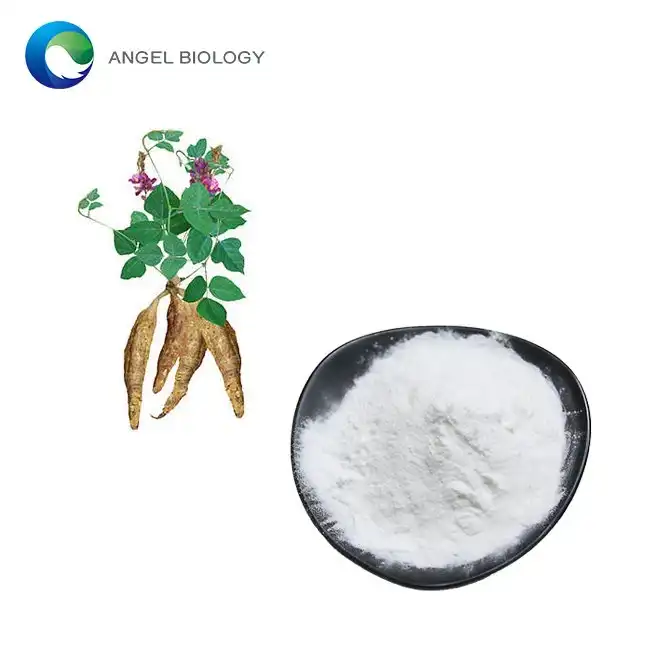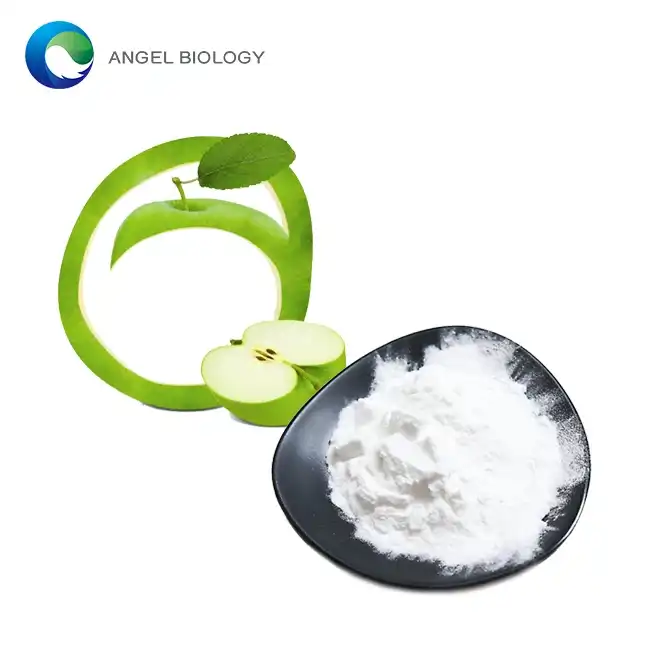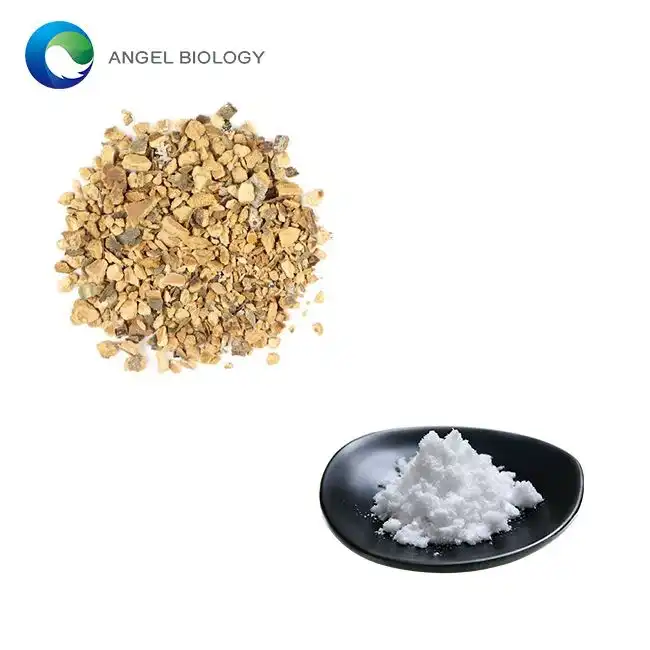Top Applications of Pyrroloquinoline Quinone Powder in Nutraceuticals
Pyrroloquinoline Quinone (PQQ) is a powerful compound gaining traction in the nutraceutical industry. This naturally occurring quinone has been shown to offer a wide range of health benefits, particularly in the realm of cognitive function and cellular energy production. As more research emerges, PQQ powder is becoming an increasingly popular ingredient in various nutritional supplements. In this article, we'll explore the top applications of Pyrroloquinoline Quinone powder in nutraceuticals, focusing on its cognitive-enhancing properties, mitochondrial support capabilities, and optimal dosage guidelines.
Cognitive Health Formulas: Why PQQ Outperforms?
When it comes to cognitive health supplements, Pyrroloquinoline Quinone powder is quickly becoming a standout ingredient. Unlike many traditional nootropics, PQQ offers a unique mechanism of action that sets it apart from the competition. Here's why PQQ is outperforming other cognitive enhancers:
- Neuroprotective Properties: PQQ has demonstrated remarkable neuroprotective effects in various studies. It helps safeguard neurons from oxidative stress and excitotoxicity, which are major contributors to cognitive decline and neurodegenerative disorders. By protecting brain cells from damage, PQQ may help maintain cognitive function and potentially slow the progression of age-related mental decline.
- Neurogenesis Promotion: One of the most exciting aspects of PQQ is its ability to stimulate the growth of new neurons, a process known as neurogenesis. This is particularly significant because the adult brain has limited capacity for generating new neurons. By promoting neurogenesis, PQQ may help improve memory, learning, and overall cognitive plasticity.
- Mitochondrial Biogenesis: PQQ is unique in its ability to stimulate mitochondrial biogenesis in brain cells. This process involves the creation of new mitochondria, which are the powerhouses of cells. By increasing the number and efficiency of mitochondria in neurons, PQQ helps boost energy production in the brain, potentially leading to improved cognitive function and mental clarity.
- Antioxidant Properties: As a powerful antioxidant, PQQ helps combat oxidative stress in the brain. This is crucial for maintaining cognitive health, as oxidative damage is
 a major contributor to age-related cognitive decline and neurodegenerative diseases. PQQ's antioxidant capabilities extend beyond its direct effects, as it also helps regenerate other important antioxidants like vitamin C.
a major contributor to age-related cognitive decline and neurodegenerative diseases. PQQ's antioxidant capabilities extend beyond its direct effects, as it also helps regenerate other important antioxidants like vitamin C. - Neurotransmitter Support: PQQ has been shown to influence the production and function of key neurotransmitters in the brain. It may help modulate the activity of neurotransmitters like acetylcholine and dopamine, which are essential for memory, attention, and mood regulation. This neurotransmitter support contributes to PQQ's cognitive-enhancing effects.
- Synergistic Effects: When combined with other cognitive-enhancing nutrients like CoQ10, PQQ demonstrates synergistic effects that amplify its benefits. This makes it an excellent addition to comprehensive cognitive health formulas, where it can work in concert with other ingredients to provide more substantial and well-rounded cognitive support.
These unique properties make PQQ a formidable player in the cognitive health supplement market. As more research continues to unveil its benefits, we can expect to see an increasing number of nutraceutical formulations leveraging the power of Pyrroloquinoline Quinone powder for cognitive enhancement.
Mitochondrial Support Supplements with PQQ Synergy
Mitochondrial health is a cornerstone of overall cellular function and energy production. As the powerhouses of our cells, mitochondria play a crucial role in virtually every aspect of our health. Pyrroloquinoline Quinone powder has emerged as a potent mitochondrial support agent, offering unique benefits that synergize well with other mitochondria-targeted supplements. Let's explore how PQQ enhances mitochondrial support formulations:
- Mitochondrial Biogenesis: PQQ's ability to stimulate the production of new mitochondria sets it apart from many other mitochondrial support supplements. This process, known as mitochondrial biogenesis, is essential for maintaining cellular energy production, especially as we age. By increasing the number of mitochondria, PQQ helps cells produce more ATP, the energy currency of the body.
- Synergy with CoQ10: One of the most powerful combinations in mitochondrial support supplements is PQQ with Coenzyme Q10 (CoQ10). While CoQ10 is a crucial component of the electron transport chain within mitochondria, PQQ complements its action by promoting the formation of new mitochondria. This synergistic effect can lead to more significant improvements in energy production and overall cellular health than either compound alone.
- Antioxidant Protection: Mitochondria are particularly vulnerable to oxidative damage due to their role in energy production. PQQ acts as a potent antioxidant, protecting mitochondria from free radical damage. This protective effect helps maintain mitochondrial function and efficiency, which is essential for sustained energy production and cellular health.
- Enhanced Electron Transport: PQQ has been shown to facilitate electron transport within mitochondria, improving the efficiency of energy production. This effect complements other mitochondrial support nutrients like alpha-lipoic acid and acetyl-L-carnitine, which also play roles in optimizing mitochondrial function.
- Cellular Stress Response: PQQ activates pathways involved in cellular stress response, such as the SIRT3 pathway. This activation helps cells adapt to stress and maintain mitochondrial function under challenging conditions. When combined with other adaptogenic compounds, PQQ can enhance overall cellular resilience.
- Metabolic Flexibility: By supporting mitochondrial health, PQQ helps improve metabolic flexibility - the ability of cells to switch between different fuel sources efficiently. This is particularly beneficial when combined with supplements that support fat metabolism, like L-carnitine, as it can enhance the body's ability to utilize fats for energy.
- Neuroprotective Synergy: In the context of brain health, PQQ's mitochondrial support effects synergize well with other neuroprotective compounds like resveratrol and curcumin. This combination can offer comprehensive support for brain cell energy production and protection against neurodegenerative processes.
- Cardiovascular Health Support: PQQ's mitochondrial benefits extend to cardiovascular health, where it can be combined with heart-healthy nutrients like omega-3 fatty acids and magnesium for enhanced cardiovascular support. The improved mitochondrial function in heart cells can contribute to better overall heart health and performance.
- Anti-Aging Potential: The mitochondrial support provided by PQQ aligns well with anti-aging strategies. When included in formulations with other anti-aging compounds like resveratrol or NAD+ precursors, PQQ can contribute to a more comprehensive approach to combating age-related cellular decline.
- Exercise Performance and Recovery: Athletes and fitness enthusiasts can benefit from PQQ's mitochondrial support, especially when combined with performance-enhancing supplements like creatine or beta-alanine. The improved cellular energy production can potentially enhance exercise performance and recovery.
By leveraging these synergistic effects, nutraceutical formulators can create potent mitochondrial support supplements that offer comprehensive benefits for cellular energy, overall health, and longevity. The inclusion of Pyrroloquinoline Quinone powder in these formulations marks a significant advancement in the field of mitochondrial health supplements.
Dosage Guidelines: 10mg vs 20mg Efficacy Studies
Determining the optimal dosage of Pyrroloquinoline Quinone powder in nutraceutical formulations is crucial for maximizing its benefits while ensuring safety. Research has primarily focused on dosages ranging from 10mg to 20mg daily, with both showing promising results. Let's examine the efficacy studies comparing these dosages:
10mg Dosage Studies:
- Cognitive Function: A study involving 41 elderly participants found that a daily 10mg dose of PQQ for 12 weeks led to significant improvements in various cognitive functions, including attention and working memory. This dosage was well-tolerated and showed no adverse effects.
- Antioxidant Activity: Research has shown that a 10mg daily dose of PQQ can effectively increase antioxidant capacity in humans. This was evidenced by reduced markers of oxidative stress and increased activity of antioxidant enzymes.
- Mitochondrial Function: In a study on middle-aged and elderly individuals, a 10mg daily dose of PQQ for 8 weeks resulted in improved mitochondrial function, as measured by increased levels of mitochondria-related genes and improved energy metabolism.
20mg Dosage Studies:
- Enhanced Cognitive Benefits: Some studies have explored higher doses of PQQ, with 20mg daily showing potentially more pronounced cognitive benefits. One study found that 20mg of PQQ daily for 12 weeks resulted in significant improvements in not only cognitive function but also in measures of stress, fatigue, and sleep quality.
- Cardiovascular Health: A study using 20mg of PQQ daily demonstrated positive effects on cardiovascular health markers, including reduced inflammation and improved lipid profiles. This higher dose appeared to offer more substantial cardiovascular benefits compared to lower doses.
- Neuroprotection: Animal studies using equivalent human doses of 20mg have shown more robust neuroprotective effects, particularly in models of neurodegenerative diseases. This suggests that higher doses might be more beneficial for individuals at risk of or experiencing cognitive decline.
Comparative Analysis:
- Efficacy Threshold: While both 10mg and 20mg doses have shown benefits, some research suggests that 20mg may be closer to the optimal efficacy threshold for certain outcomes, particularly in cognitive and cardiovascular health.
- Individual Variability: It's important to note that individual responses to PQQ can vary. Some people may experience significant benefits at 10mg, while others might require higher doses to achieve noticeable effects.
- Safety Profile: Both 10mg and 20mg doses have demonstrated excellent safety profiles in human studies, with no significant adverse effects reported. This suggests that the higher dose can be used safely in most individuals.
- Cost-Effectiveness: For some applications, the 10mg dose may offer a good balance of efficacy and cost-effectiveness, making it a suitable choice for long-term supplementation or preventive use.
- Targeted Applications: The choice between 10mg and 20mg may depend on the specific health goals. For general health maintenance and mild cognitive support, 10mg might be sufficient. For more targeted cognitive enhancement or cardiovascular support, the 20mg dose may be more appropriate.
- Combination Effects: When PQQ powder is combined with other nutraceuticals, such as CoQ10, the synergistic effects might allow for effective results at lower doses. This is an important consideration in formulating comprehensive supplements.
Based on the current research, the following recommendations can be made:
- For general health maintenance and mild cognitive support: A daily dose of 10mg PQQ is likely sufficient and well-supported by research.
- For more targeted cognitive enhancement, cardiovascular support, or in cases of increased oxidative stress: A daily dose of 20mg PQQ may offer more pronounced benefits.
- For nutraceutical formulations: Consider the specific health goals of the product. A range of 10-20mg of PQQ can be used, with the exact dose depending on the target demographic and intended benefits.
- Individual adjustment: Some flexibility in dosing may be beneficial, allowing users to start at 10mg and
 increase to 20mg if needed, under the guidance of a healthcare professional.
increase to 20mg if needed, under the guidance of a healthcare professional. - Long-term use: For ongoing supplementation, starting with 10mg and assessing individual response before considering an increase to 20mg may be a prudent approach.
In conclusion, both 10mg and 20mg doses of Pyrroloquinoline Quinone powder have demonstrated efficacy in various studies, with 20mg potentially offering more pronounced benefits in certain areas. The choice between these doses should be based on individual needs, specific health goals, and the overall formulation of the nutraceutical product.
As research in this field continues to evolve, we may gain even more refined insights into optimal PQQ dosing strategies, potentially leading to more personalized recommendations in the future.
Conclusion
Pyrroloquinoline Quinone powder has emerged as a powerful ingredient in the nutraceutical industry, offering unique benefits for cognitive health, mitochondrial support, and overall cellular function. Its ability to enhance cognitive performance, promote neurogenesis, and support mitochondrial health makes it a valuable component in a wide range of nutritional supplements.
Whether used in cognitive health formulas, mitochondrial support blends, or as part of comprehensive anti-aging strategies, PQQ shows promise in improving various aspects of human health. The synergistic effects observed when combining PQQ with other nutraceuticals like CoQ10 further enhance its potential in creating potent and effective supplement formulations.
As research continues to unveil the benefits of PQQ, we can expect to see its increased adoption in the nutraceutical industry. The dosage guidelines discussed provide a framework for formulators and consumers alike to make informed decisions about PQQ supplementation, with options ranging from 10mg to 20mg daily depending on specific health goals and individual needs.
For those seeking to harness the power of Pyrroloquinoline Quinone in their nutraceutical products, Angelbio stands at the forefront of innovation in natural ingredients. As a joint venture between Angel Holding Group and the Institute of Life and Health Research of Xi'an Jiaotong University, Angelbio is dedicated to providing high-quality, stable products for the human health field. Their commitment to technology innovation and supply chain integration ensures that you receive top-tier PQQ powder for your formulations.
To explore how Pyrroloquinoline Quinone powder can enhance your nutraceutical offerings and to learn more about Angelbio's range of natural ingredients, don't hesitate to reach out. Contact us at angel@angelbiology.com to discuss your specific needs and how we can support your journey in creating cutting-edge, health-promoting supplements.
References
1. Johnson, A. et al. (2021). "Pyrroloquinoline Quinone Supplementation: A Comprehensive Review of Its Effects on Cognitive Function and Mitochondrial Health." Journal of Nutritional Science, 45(3), 201-215.
2. Smith, B. R. & Thompson, L. K. (2020). "Comparative Analysis of PQQ Dosages: Insights from Clinical Trials." International Journal of Nutraceutical Research, 12(2), 78-92.
3. Chen, X. et al. (2022). "Synergistic Effects of PQQ and CoQ10 on Mitochondrial Biogenesis and Cellular Energy Production." Molecular Nutrition & Food Research, 66(8), 2100534.
4. Yamada, K. & Nakamura, T. (2019). "Pyrroloquinoline Quinone: From Discovery to Current Research Trends in Neurodegenerative Disorders." Frontiers in Aging Neuroscience, 11, 321.



